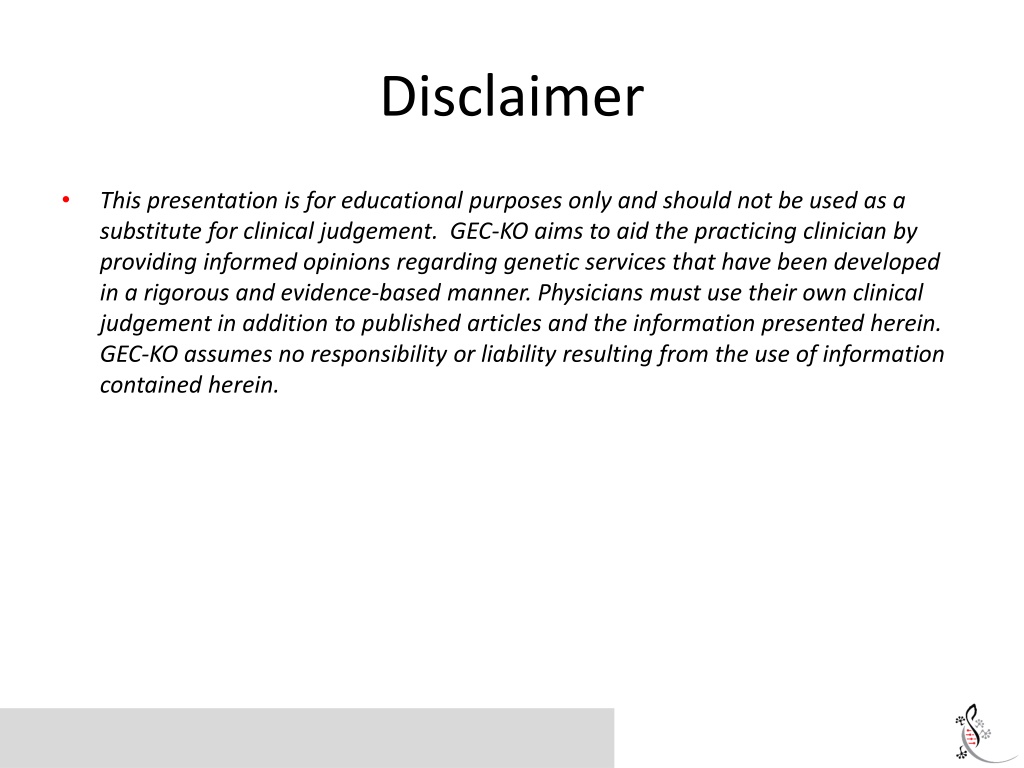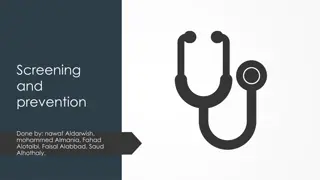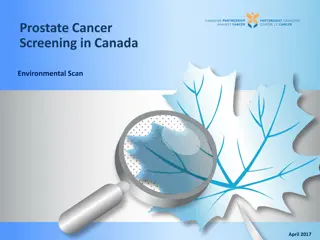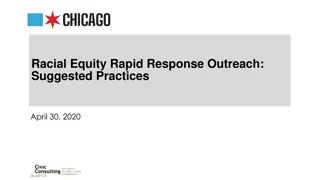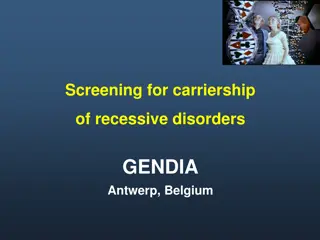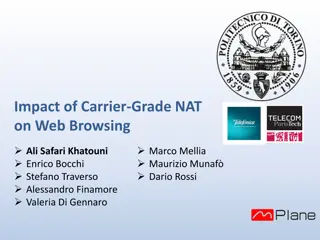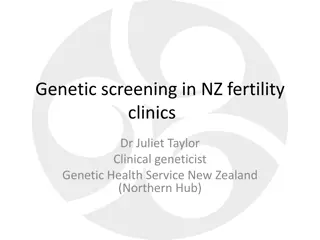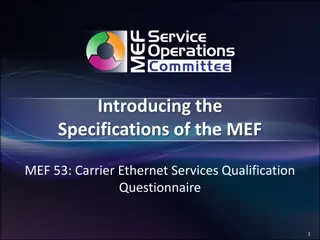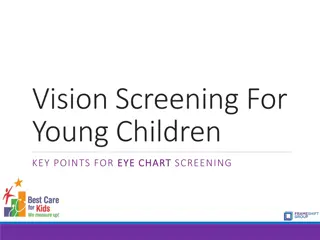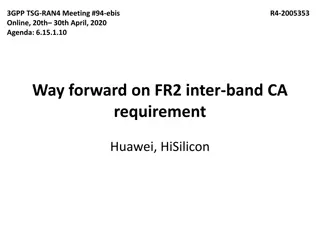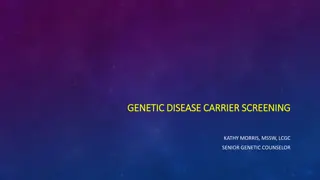Exploring Expanded Carrier Screening in Family Planning
Learn about expanded carrier screening as a tool for identifying genetic risks in family planning scenarios. Understand the importance of genetic testing, considerations for non-consanguineous couples like Julie and Chris, and the evolving landscape of genetic services. Explore key aspects such as family history assessment, counseling, and the potential benefits of expanded carrier screening. Gain insights into patient considerations and provider responsibilities in genetic testing and counseling.
Download Presentation

Please find below an Image/Link to download the presentation.
The content on the website is provided AS IS for your information and personal use only. It may not be sold, licensed, or shared on other websites without obtaining consent from the author. Download presentation by click this link. If you encounter any issues during the download, it is possible that the publisher has removed the file from their server.
E N D
Presentation Transcript
Disclaimer This presentation is for educational purposes only and should not be used as a substitute for clinical judgement. GEC-KO aims to aid the practicing clinician by providing informed opinions regarding genetic services that have been developed in a rigorous and evidence-based manner. Physicians must use their own clinical judgement in addition to published articles and the information presented herein. GEC-KO assumes no responsibility or liability resulting from the use of information contained herein.
Expanded carrier screening Developed by Ms. Shawna Morrison, Dr. Judith Allanson and Dr. June Carroll (2016)
Objectives Following this session, for each of the topics discussed, the learner will be able to: Identify patients for whom referral to genetics or other specialty and/or consideration of genetic testing is appropriate Discuss and address patient concerns about the genomic technology and genetic contribution to the illness Find high quality genomics educational resources appropriate for primary care
Expanded carrier screening Pearls Family history-based risk assessment is still the gold standard in initial assessment for heritable conditions Currently, expanded carrier screening (beyond family history and ethnicity) is not standard of care, however providers may consider making patients aware of the option Physicians ordering testing need to be aware of the conditions on the expanded carrier panels and prepared to provide pre- and post-test counselling More carriers of serious inherited disorders are expected to be identified Expanded carrier screening may help some couples obtain timely genetic test results
Case 1: Julie and Chris A healthy non-consanguineous couple Both are 33 years old Julie is of French Canadian and Northern European ancestry Chris is of German and English ancestry and he believes there may be some Ashkenazi Jewish ancestry There is no significant family history for either member of the couple Planning to start their family
Case 1: Julie and Chris Julie s cousin, Jean, is the same age and also recently married Jean lives in Boston, MA and was offered a family planning carrier screening panel which was partly covered by her health insurance Julie would also like to have this panel and understands that she would have to pay for the test herself She needs you to order the test She has brought all the completed paperwork to you
Why offer traditional reproductive carrier screening? To facilitate informed reproductive decision making by identifying those couples at risk of having an affected child with an (autosomal or X-linked) recessive disorder
How is traditional reproductive carrier screening offered? Screening is ideally offered to all individuals considering a pregnancy (pre-conception) and to women presenting at their first prenatal visit, regardless of gestational age Allows for the greatest number of options with more time to make an informed decision Adoption Egg or Sperm donor Assisted reproductive technology (i.e. in vitro fertilization with preimplantation genetic diagnosis (IVF with PGD)) Prenatal diagnosis with the option of termination Consideration of a different reproductive partner Limitation of family size or not have children Wilson 2016 JOGC
How is traditional reproductive carrier screening offered? Screening is ideally offered to all individuals considering a pregnancy (pre-conception) and to women presenting at their first prenatal visit, regardless of gestational age Allows for the greatest number of options with more time to make an informed decision Discussion about the value and risk of carrier screening Wilson 2016 JOGC
How is traditional reproductive carrier screening offered? Screening is ideally offered to all individuals considering a pregnancy (pre-conception) and to women presenting at their first prenatal visit, regardless of gestational age Offered following guidelines which are based on family history and ethnicity Remember: Family history-based risk assessment is still the gold standard in initial assessment for heritable conditions Wilson 2016 JOGC
What are the Canadian recommendations for reproductive carrier screening?
What are the Canadian recommendations for reproductive carrier screening? Geneticseducation.ca > Point of Care Tools > Reproductive genetic carrier screening in Canada
What are the Canadian recommendations for reproductive carrier screening? Geneticseducation.ca > Point of Care Tools > Reproductive genetic carrier screening in Canada
What are the Canadian recommendations for reproductive carrier screening? Geneticseducation.ca > Point of Care Tools > Reproductive genetic carrier screening in Canada
What are the Canadian recommendations for reproductive carrier screening? Geneticseducation.ca > Point of Care Tools > Reproductive genetic carrier screening in Canada
Why offer expanded carrier screening? Screening beyond family history and ethnicity Allows testing of all individuals regardless of family history, ethnicity or geographic origin
Why offer expanded carrier screening? Screening beyond family history and ethnicity Allows testing of all individuals regardless of family history, ethnicity or geographic origin Increased detection of carriers of serious inherited disorders
Why offer expanded carrier screening? Screening beyond family history and ethnicity Allows testing of all individuals regardless of family history, ethnicity or geographic origin Increased detection of carriers of serious inherited disorders Technology is rapidly advancing and the costs are decreasing
Why offer expanded carrier screening? Screening beyond family history and ethnicity Allows testing of all individuals regardless of family history, ethnicity or geographic origin Increased detection of carriers of serious inherited disorders Technology is rapidly advancing and the costs are decreasing Supports patient autonomy
Expanded carrier screening Is generally a self-pay service Provincial funding has been approved in ON Individuals with a limited family history (e.g. adopted) Individuals whose partner is a carrier of a condition on a panel Individuals of Ashkenazi Jewish descent Consanguineous couples
Expanded carrier screening Is generally a self-pay service Is not standard of care and does not replace current guidelines SOGC/CCMG (2016) state, The option of this technology should be part of the informed consent process. Unclear clinical utility and relevance in reproductive planning Panels do not typically distinguish between serious and mild, or early-onset and late-onset conditions Most individuals prefer test to be offered via their family physician [Plantinga 2016 EJHG]
Pre-test counselling checklist Patient is aware that expanded carrier screening panels: Are voluntary Screen for conditions of variable severity Screen for conditions with different modes of inheritance e.g. not all are recessive Assume accurate paternity for risk assessment Do not rule out risk in the event results are negative May be diagnostic or reveal information about an individual s personal health Do not necessarily contain all conditions recommended be screened e.g. -thalassemia, family history Access to genetic counselling or confirmatory testing may be limited
Pre-test considerations Most companies test using whole exome sequencing as the testing method (vs. targeted mutation analysis) Whole exome sequencing is reading of the coding region (exons) of a gene
Pre-test considerations Most companies test using whole exome sequencing as the testing method (vs. targeted mutation analysis) This method improves sensitivity of testing across ethnicities Limited detection of some types of mutations Laboratories are likely to report variants which are classified as likely pathogenic How would you counsel/follow-up for a variant? Will your local genetics clinic provide support?
Post-test counselling and considerations Genetic counselling through testing company may be available +/- extra fee
Post-test counselling and considerations Genetic counselling through testing company may be available +/- extra fee You (ordering provider) should have a plan to provide accurate information and follow up to patients, including: Risk counselling and review of options Test partner if one member of the couple is a carrier Significance of this information for other family members who may also be carriers Additional testing e.g. biochemical testing for non- Ashkenazi Jewish (AJ) member of a couple where the AJ member is a carrier of Tay Sachs disease
Post-test counselling and considerations Genetic counselling through testing company may be available +/- extra fee You (ordering provider) should have a plan to provide accurate information and follow up to patients A negative result does not eliminate risk
Post-test counselling and considerations Genetic counselling through testing company may be available +/- extra fee You (ordering provider) should have a plan to provide accurate information and follow up to patients A negative result does not eliminate risk Access to formal genetic counselling or confirmatory testing may be required but limited by local resources
Back to Julie and Chris Julie and Chris are found to both be carriers of known pathogenic mutations in the cystic fibrosis gene, CFTR You refer the couple to your local genetics for follow-up counselling
Your local genetics centre Geneticseducation.ca > Genetics Centres
Expanded carrier screening Pearls Family history-based risk assessment is still the gold standard in initial assessment for heritable conditions Currently, expanded carrier screening (beyond family history and ethnicity) is not standard of care, however providers may consider making patients aware of the option Physicians ordering expanded carrier testing need to be aware of the conditions on the panels and prepared to provide pre- and post-test counselling More carriers of serious inherited disorders are expected to be identified Expanded carrier screening may help some couples avoid long wait times for genetics consults
